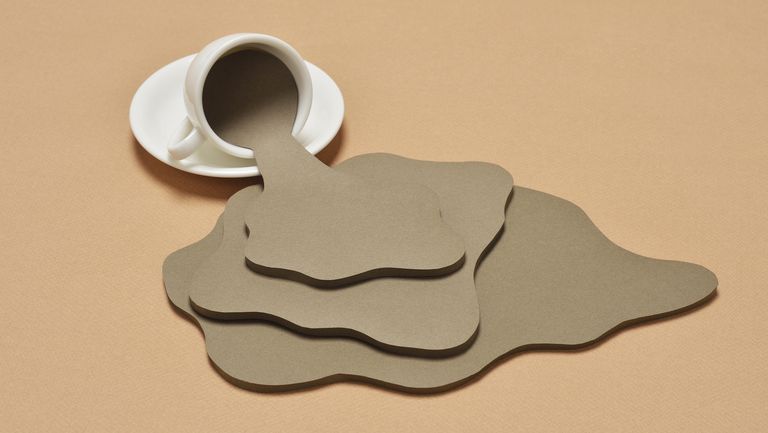‘My Upset Stomach Turned Out To Be A Coffee Intolerance’

I’m not really sure how my coffee addiction even started. As a high-energy kid who used to (literally) run around in circles, I had never even considered it.
It wasn’t until I was 19, when a friend handed me a small iced coffee after a late night out, that I even tasted the stuff. I thought it was pretty disgusting at the time…but I needed the boost on a sluggish morning.
Fast forward to 2018. I’m in my early thirties and have lived in the over-caffeinated city of New York since college. It’s hard to imagine a life without my trusty drink of choice. It’s there for me when I need a pick-me-up, or for a formal business meeting, or even an impromptu bitch sesh with coworkers. It keeps me going, no matter how little sleep I’ve had.
So imagine my surprise when I found out that I might have a coffee intolerance.
‘It all started with a food sensitivity test.’
I had always assumed I was sensitive to certain foods. As a teenager, I struggled with cystic acne that seemed exacerbated by dairy and chocolate. But over the years, and after a course of Accutane, my skin cleared up and I stopped paying such close attention to what I was eating.
But in recent months, I’d been feeling more anxiety-prone than normal, my skin was experiencing minor breakouts, and my stomach was regularly upset. (Like every time I drank coffee, I felt a powerful need to go…TMI!) I wondered if maybe coffee wasn’t agreeing with me like it used to.
So when someone at Next Health, a Los Angeles medspa, suggested I take a Vibrant Wellness food sensitivity test, I decided to try it. I was already there, trying out a different beauty service (cryotherapy!), so I figured, Why not?
“A month without coffee, and I was feeling great—maybe the healthiest I’ve ever felt in my life.”
While there are several different kinds of tests to assess food allergies, the one I took measured levels of IgG, an antibody produced by white blood cells, says Tania Dempsey, M.D. who focuses on food sensitivities, among other things, in her practice. “The thought is that if a patient has high levels of IgG to a certain food, then that must indicate that the immune system is fighting it or trying to reject it,” she says.
However, she admits IgG levels are not a perfect science—this kind of test is something that you shouldn’t just take at face value.
When the test results were emailed to me a few weeks later, I was shocked to discover that I had higher levels of IgG to a wide variety of foods like beef, chicken, lobster, and even black pepper.
‘But the biggest culprit? Coffee.’
Uh, what?? According to Megan Retterath, the nurse practitioner at Next Health, my test indicated that coffee (and other foods) triggered a reaction in my body meant to turn me off from future consumption.
“Intolerance to coffee is not that uncommon and can manifest differently in each person, while an allergy to coffee is less common but not unheard of,” adds Dempsey. “Reactions, whether they are from allergy or intolerance, can come from compounds in the coffee or to the caffeine itself.”
According to Dempsey, the most common symptoms of coffee intolerance include:
In order to confirm the results of the test, Retterath suggested that I consider an elimination diet—removing all triggers from my system for a set period of time before slowly re-introducing them one at a time, to see which caused problems.
That meant nixing all the foods that were flagged by the test as triggers: beef, chicken, halibut, shrimp, lobster, carrots, watermelon, black pepper, and of course, coffee.
There was no room for cheating, either. Not even for the smallest iced coffee. “If you’re still consuming foods that you are sensitive to, such as coffee, you are still having your immune system respond and ramp up—which is the exact opposite response we want,” Retterath says.
It would be an all or nothing task.
‘I’ll admit, I had to psych myself up for a good two weeks.’
I picked a date far in the future, and set a reminder with Siri.
When that day finally rolled around, I figured I couldn’t go cold turkey on caffeine. So my morning Dunkin’ Donuts run was more of a swap—iced green or black teas became the norm, per Retterath’s recommendation. And while tea offers nowhere near the jolt that coffee supplies, it did spare me a giant, caffeine-related migraine later in the day.
After a week of no coffee, and more limited caffeine, I started to see subtle changes. My skin seemed to have cleared up a bit. My sleep—which had always been solid regardless of my caffeine intake—seemed more refreshing. I was noticeably (and yes, TMI again) less gassy and had a less upset stomach, and I also didn’t wake up bloated in the mornings. In fact, I felt really healthy overall, and like something was changing.

So I attempted to remove some of the other foods indicated on my test.
About a month in, I had mostly forgotten about coffee and its many pleasures. Sure, I got a lot of confused glances from friends, family and even strangers when I mentioned I wasn’t drinking coffee. But overall I was feeling great—maybe the healthiest I’ve ever felt in my life.
Six weeks went by, then eight, then ten. And that’s when I caved.
‘I know, I know. I started drinking coffee again.’
Did I explode? No, of course not. Did I see a visible change in my body? You betcha.
Though my skin did not break out, when I started drinking coffee again, it instantly felt duller and was generally more agitated. My stomach felt bloated too, the same way it had been in the mornings before I started the elimination diet—even though I hadn’t re-introduced any other foods.

I immediately reached out to the folks at Next Health. Could this reaction confirm that I really was sensitive to coffee?
The short answer: maybe. But part of my reaction could have been as simple as my body readjusting to coffee after a long absence, says Darshan Shah, M.D., Retterath’s colleague at Next Health.
“Because coffee is an acidic beverage and an irritant, it can sometimes cause bloating if your gastrointestinal system has not developed a tolerance to it,” he says.
Other culprits could be lactose intolerance (to creamer) or IBS, says Shah. It would take further testing to truly get to the root cause.
From my own experiment, I can say that there’s definitely something about coffee that seems to upset my stomach and skin. I definitely felt way better during those months where I wasn’t drinking the stuff. But even though I’ve significantly cut my coffee intake…old habits die hard.
My goal is to get back to a place of being coffee-free in the near distant future. Java just doesn’t seem to jive well with me.
Source: Read Full Article


